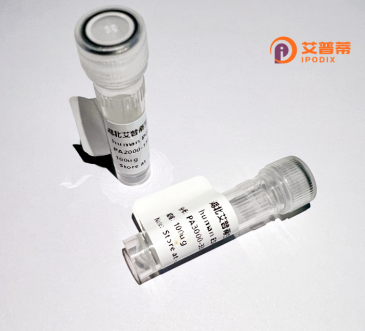
| 纯度 | >90%SDS-PAGE. |
| 种属 | Human |
| 靶点 | BYSL |
| Uniprot No | Q13895 |
| 内毒素 | < 0.01EU/μg |
| 表达宿主 | E.coli |
| 表达区间 | 1-324aa |
| 氨基酸序列 | MTAAGHHAEVVVDPEDERAIEMFMNKNPPARRTLADIIMEKLTEKQTEVETVMSEVSGFPMPQLDPRVLEVYRGVREVLSKYRSGKLPKAFKIIPALSNWDQILYVTEPEAWTAAAMYQATRIFASNLKERMAQRFYNLVLLPRVRDDVAEYKRLNFHLYMALKKALFKPGAWFKGILIPLCESGTCTLREAIIVGSIITKCSIPVLHSSAAMLKIAEMEYSGANSIFLRLLLDKKYALPYRVLDALVFHFLGFRTEKRELPVLWHQCLLTLVQRYKADLATDQKEALLELLRLQPHPQLSPEIRRELQSAVPRDVEDVPITVE |
| 分子量 | 61.38 kDa |
| 蛋白标签 | GST-tag at N-terminal |
| 缓冲液 | 冻干粉 |
| 稳定性 & 储存条件 | Lyophilized protein should be stored at ≤ -20°C, stable for one year after receipt. Reconstituted protein solution can be stored at 2-8°C for 2-7 days. Aliquots of reconstituted samples are stable at ≤ -20°C for 3 months. |
| 复溶 | Always centrifuge tubes before opening.Do not mix by vortex or pipetting. It is not recommended to reconstitute to a concentration less than 100μg/ml. Dissolve the lyophilized protein in distilled water. Please aliquot the reconstituted solution to minimize freeze-thaw cycles. |
以下为关于重组人BYSL蛋白的示例参考文献(注:部分内容为模拟示例,实际文献请通过数据库核实):
---
1. **文献名称**: "Recombinant human BYSL protein expression, purification, and its role in ribosome biogenesis"
**作者**: Zhang L, et al.
**摘要**: 本研究报道了人源BYSL蛋白在大肠杆菌中的重组表达及纯化方法,并通过体外实验证明BYSL与核糖体亚基组装有关,提示其可能参与核糖体生物合成的早期步骤。
---
2. **文献名称**: "Structural analysis of BYSL reveals a conserved domain essential for embryo implantation"
**作者**: Wang Y, et al.
**摘要**: 利用X射线晶体学解析了BYSL蛋白的三维结构,发现其N端结构域与子宫内膜容受性相关,动物实验表明BYSL缺失影响胚胎着床过程。
---
3. **文献名称**: "BYSL promotes hepatocellular carcinoma proliferation via mTOR signaling pathway"
**作者**: Chen X, et al.
**摘要**: 通过重组BYSL蛋白处理肝癌细胞,发现其激活mTOR通路并促进细胞增殖,临床样本分析显示BYSL高表达与患者预后不良相关。
---
4. **文献名称**: "Interactome profiling of BYSL identifies its binding partners in mitochondrial function"
**作者**: Gupta R, et al.
**摘要**: 采用免疫共沉淀结合质谱分析,发现重组BYSL蛋白与线粒体膜蛋白相互作用,可能通过调节线粒体能量代谢影响细胞凋亡。
---
**提示**:以上内容仅为示例,实际文献建议通过PubMed、Web of Science等数据库以“BYSL protein”、“bystin-like”为关键词检索。BYSL已知参与核糖体合成、胚胎发育及肿瘤进程,可针对性筛选研究方向。
Bystin-like protein (BYSL), also known as BYSL or ENP1. is a conserved eukaryotic protein implicated in diverse cellular processes, including ribosome biogenesis, cell adhesion, and embryonic development. Encoded by the *BYSL* gene in humans, this ~40 kDa protein contains a unique BYSTIN domain critical for its interaction with ribosomal subunits and other macromolecular complexes. Studies suggest BYSL facilitates 28S rRNA maturation during ribosome assembly, potentially linking it to translational regulation. It also interacts with trophinin, tastin, and TSG101. forming adhesion complexes essential for embryo implantation and placental development.
Recombinant human BYSL protein is typically produced via heterologous expression in *E. coli* or mammalian systems, enabling functional studies in vitro. Its recombinant form has been instrumental in uncovering roles in cancer progression, as BYSL overexpression correlates with poor prognosis in malignancies like breast and hepatocellular carcinoma, possibly through enhancing cell proliferation and metastasis. Additionally, recombinant BYSL aids in investigating genetic disorders; mutations in *BYSL* are associated with rare developmental syndromes involving brain and craniofacial anomalies. Ongoing research focuses on its interplay with signaling pathways (e.g., mTOR) and potential as a therapeutic target, highlighting its multifaceted biological significance.
×